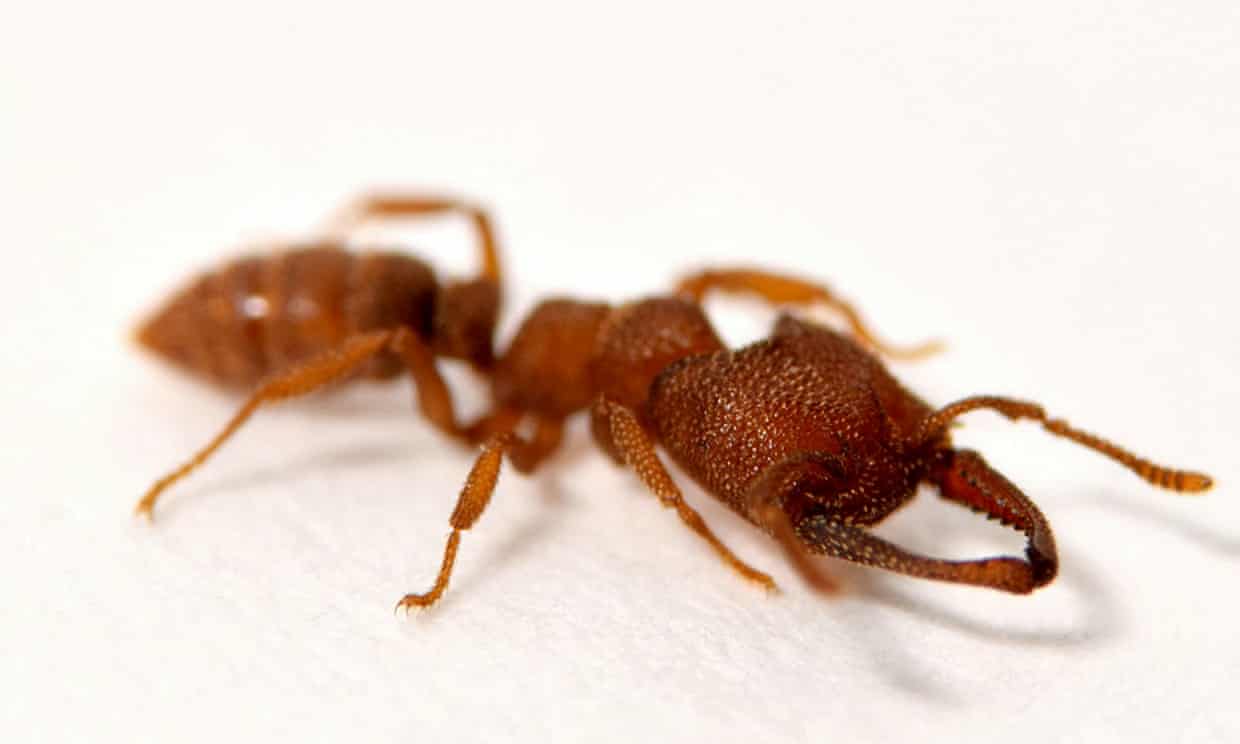Scientists discover the Dracula ant is the world's fastest mover
Insect uses lethal speed of its spring-loaded mandibles to stun or kill prey

A free daily email with the biggest news stories of the day – and the best features from TheWeek.com
You are now subscribed
Your newsletter sign-up was successful
A new study of the Dracula ant has found that it is the fastest animal in the world.
According to a new study, the Dracula ant, Mystrium camillae, can snap its mandibles at speeds of up to 90 metres per second (over 200 mph), making it the fastest animal movement on record.

The ants can be found in Australia, tropical Africa and South-East Asia and “use the explosive motion to attack, stun and kill prey, which is then fed to their larvae”, says The Guardian. Scientists were able to understand the exact speed of the snapping motion only with the advent of high-speed video technology over the past 10 years.
The Week
Escape your echo chamber. Get the facts behind the news, plus analysis from multiple perspectives.

Sign up for The Week's Free Newsletters
From our morning news briefing to a weekly Good News Newsletter, get the best of The Week delivered directly to your inbox.
From our morning news briefing to a weekly Good News Newsletter, get the best of The Week delivered directly to your inbox.
“The high accelerations of Mystrium strikes likely result in high-impact forces necessary for predatory or defensive behaviours,” the researchers wrote in a report of their findings in the journal Royal Society Open Science.
Researchers say the tiny blood-sucking creature powers its mandibles by pressing the tips together, spring loading them with internal stresses that release when one mandible slides across the other — similar to a human finger snap.
“The ants use this motion to smack other arthropods, likely stunning them, smashing them against a tunnel wall or pushing them away. The prey is then transported back to the nest, where it is fed to the ants' larvae,” Suarez said.
“Scientists have described many different spring-loading mechanisms in ants, but no one knew the relative speed of each of these mechanisms," Larabee said. "We had to use incredibly fast cameras to see the whole movement. We also used X-ray imaging technology to be able to see their anatomy in three dimensions, to better understand how the movement works”, he added.
A free daily email with the biggest news stories of the day – and the best features from TheWeek.com
This particular species of ant are rarely encountered “as they live in large colonies underground, or inside tree trunks”, says science website Geek.com. Their name wasn’t derived from their snap-jaw, but “from their extremely unusual feeding habits”, the website adds. They practise a sort of “non-destructive cannibalism”, chewing holes into and feeding on the blood of the colony’s own larvae.
-
 The ‘ravenous’ demand for Cornish minerals
The ‘ravenous’ demand for Cornish mineralsUnder the Radar Growing need for critical minerals to power tech has intensified ‘appetite’ for lithium, which could be a ‘huge boon’ for local economy
-
 Why are election experts taking Trump’s midterm threats seriously?
Why are election experts taking Trump’s midterm threats seriously?IN THE SPOTLIGHT As the president muses about polling place deployments and a centralized electoral system aimed at one-party control, lawmakers are taking this administration at its word
-
 ‘Restaurateurs have become millionaires’
‘Restaurateurs have become millionaires’Instant Opinion Opinion, comment and editorials of the day
-
 Epstein files topple law CEO, roil UK government
Epstein files topple law CEO, roil UK governmentSpeed Read Peter Mandelson, Britain’s former ambassador to the US, is caught up in the scandal
-
 Iran and US prepare to meet after skirmishes
Iran and US prepare to meet after skirmishesSpeed Read The incident comes amid heightened tensions in the Middle East
-
 Israel retrieves final hostage’s body from Gaza
Israel retrieves final hostage’s body from GazaSpeed Read The 24-year-old police officer was killed during the initial Hamas attack
-
 China’s Xi targets top general in growing purge
China’s Xi targets top general in growing purgeSpeed Read Zhang Youxia is being investigated over ‘grave violations’ of the law
-
 Panama and Canada are negotiating over a crucial copper mine
Panama and Canada are negotiating over a crucial copper mineIn the Spotlight Panama is set to make a final decision on the mine this summer
-
 Why Greenland’s natural resources are nearly impossible to mine
Why Greenland’s natural resources are nearly impossible to mineThe Explainer The country’s natural landscape makes the task extremely difficult
-
 Iran cuts internet as protests escalate
Iran cuts internet as protests escalateSpeed Reada Government buildings across the country have been set on fire
-
 US nabs ‘shadow’ tanker claimed by Russia
US nabs ‘shadow’ tanker claimed by RussiaSpeed Read The ship was one of two vessels seized by the US military